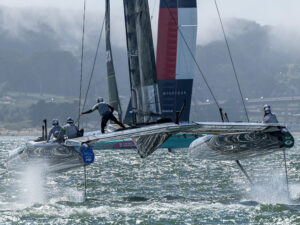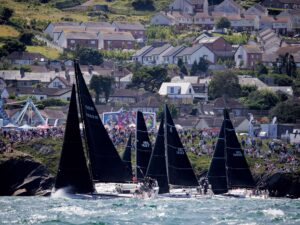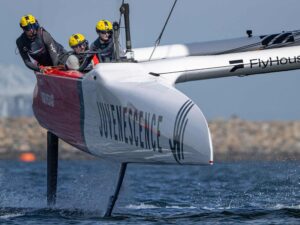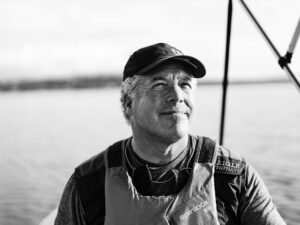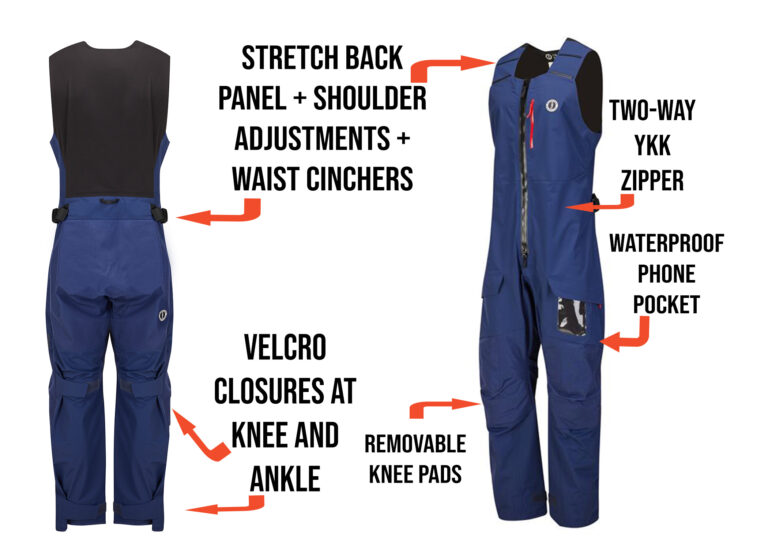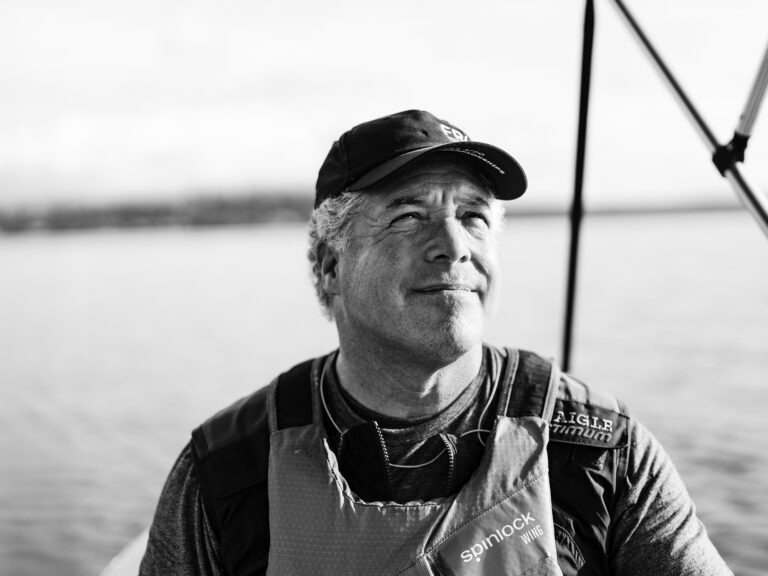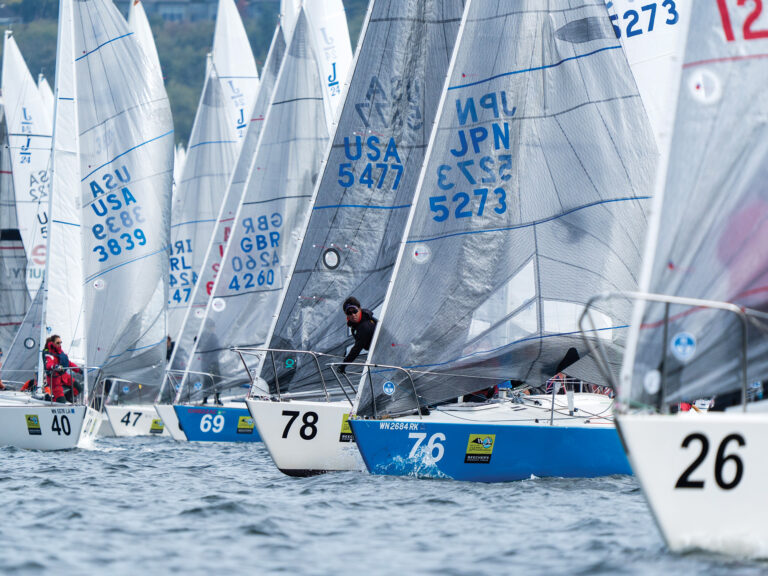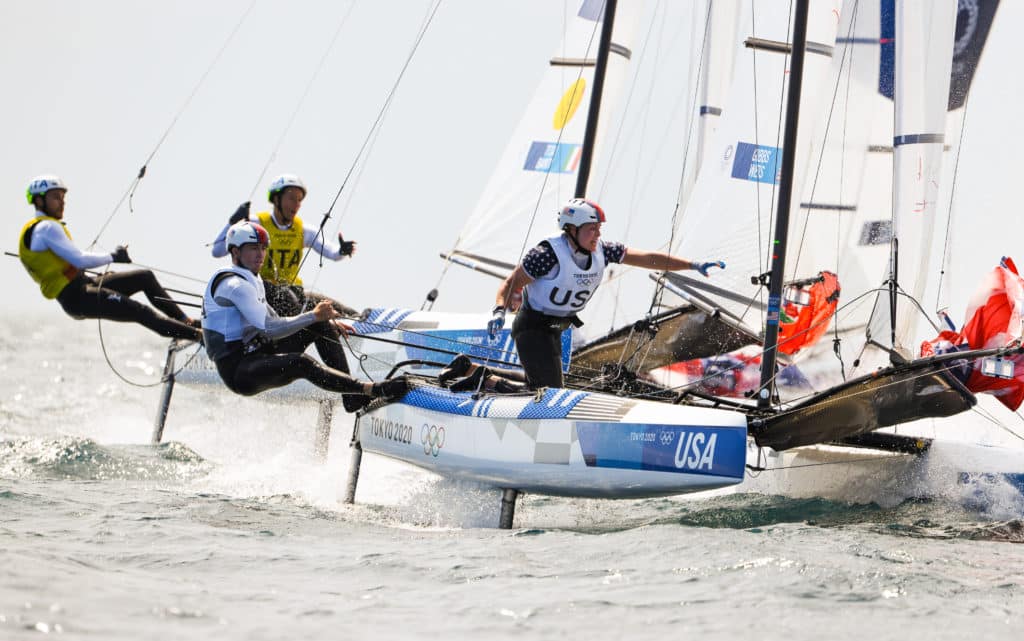
The highlights of the day for the US Sailing Team came in the Men’s RS:X and Men’s Laser classes, where years of effort and steady improvement paid off for two athletes competing in their second consecutive Olympic regatta. In a day five that was a close copy of day four from a weather perspective, Enoshima delivered wind, waves and close racing among the world’s best dinghy, board and multihull sailors.
RS:X board sailor Pedro Pascual (Miami, Fla.) entered day five of the event with a chance to cement his substantial improvement from Rio 2016 by earning a medal race berth. A 7th place in the final full-fleet race clinched the significant career milestone for the Miami native. “In the final race, I just knew that I had to keep my confidence up, and not worry about the medal race too much,” said Pascual, who finished 28th in his Olympic debut five years ago. “The first two races didn’t go my way, and I figured it couldn’t be three in a row.”
Pascual earned six single-digit scores across 12 races after never fished higher than 20th in Rio. “It’s been a hard five years,” said Pascual. “I made a commitment to improving after Rio, and I’m proud and excited to represent Team USA in the medal race on Saturday.” Saturday’s RS:X medal race will feature 10 competitors, and will count for double points. Pascual enters the medal race in 9th overall, and a chance to move up as high as 8th.
In the Laser, Charlie Buckingham (Newport Beach, Calif.) had one of the best performances by an American sailor in the men’s singlehanded class in recent memory, with his 3, 2 scoreline on the day trailing only that of regatta leader Matt Wearn (AUS), who notched a 1,1. “The two races were pretty similar,” said Buckingham, a two-time College Sailor of the Year. “The key was to get off the line and hike as hard as you can. It was a speed race, and I had pretty good speed today, so that served me well.”
Buckingham now stands in 8th overall, and the top-10 field in the Laser features a notably tight points spread heading into the final day of full-fleet racing on Friday. “The goal for tomorrow is to have another day like today. The beginning of the regatta was a bit up and down. I knew I had to put in a good day today, and that’s the plan tomorrow as well.”
In the Men’s 470, four-time Olympian Stu McNay (Providence, R.I.) and Rio 2016 returner Dave Hughes (Miami, Fla.) finished 9, 10 on the day, and sit in 11th overall. The 4th place finishers from Rio flashed their well-documented speed in both races but encountered frustration along the way. McNay and Hughes rounded the first mark of Race 3 in 3rd, but fell to 9th at the finish in a deep class featuring a 13-point spread between 3rd and 12th places overall. In Race 4, the veteran pair had a tough start, rounded the first mark in 15th, but recovered to 10th.
In the men’s heavyweight Finn class, Luke Muller (Ft. Pierce, Fla.) had a tough Race 5 to open the day, but bounced back in a big way by rounding the first weather mark of Race 6 in the lead. The 2013 U.S. Youth Champion battled with a far-launched group of leaders before ultimately finishing 4th and ending the day in 12th overall.
“The last two days I had a lot of trouble downwind, but I think I was just doing a bit too much and not letting myself feel the waves,” said Muller. “After the first upwind of that last race today, rounding in front without a lot of pressure on, I just kind of slowed things down and got on some waves. It was really nice to finish on a high going into the [Finn class] rest day. We have a lot of racing ahead and a lot of work to be done.”
In the Nacra 17, Riley Gibbs (Long Beach, Calif.) and Anna Weis (Fort Lauderdale, Fla.) had some notable moments, including rounding the first mark of Race 6 in the lead. Ultimately, Gibbs and Weis finished with a 6, 1, (13) on the day, and sit in 10th overall.
“I think we’re fast but pretty inconsistent,” said Gibbs. “We’re working on our technique downwind, and on working together. I think we can race with anyone in this fleet, and we’re just excited for the days ahead.” Weis added that racing a foiling class in big swells requires both mental and physical resilience. “It’s pretty full on. You have to really be ‘on it’ every second. You can’t let up your focus for one instant. As the race goes on, and you get tired, it becomes a bigger mental challenge, but a rewarding one if you can keep the hammer down.”
In the Women’s 470, Nikole Barnes (St. Thomas, U.S.V.I.) and Lara Dallman-Weiss (Shoreview, Minn.) scored a (15), 13 and now sit in 13th overall. The pair have so far exclusively raced on the inshore “Enoshima” course during the first four races of their series, and will get to try their hands at the “Zushi” course further offshore on Friday.
Farrah Hall (Annapolis, Md.) concluded her event with a 16, 16, 16 in the 27-board Women’s RS:X fleet, ending the regatta in 15th overall. As full-fleet racing has ended, and Hall is not in the top-10 overall, she will not progress to the medal race. Tokyo 2020 is the second Olympics for Hall, who finished 20th at London 2012. Hall raced in heavy winds and big waves for much of the week, conditions she noted she has struggled with in the past, but showed significant improvement off Enoshima.
“As far as competition goes, this is one of the best regattas that I’ve ever had,” said Hall. “My speed was awesome. I was smoking around the course and I had some good fights. What I’m really happy with is that I gave 100 percent, did everything that I could, and I sailed well. I didn’t make any major mistakes and I finished with a really good regatta for me. In London, I was a little bit less prepared just because I was more of a rookie and I wasn’t extremely happy with my regatta. But at Tokyo 2020 I can say that I’m very happy with this regatta. I have a huge appreciation for the RS:X class, where you have to be a real athlete to sail it.”
Racing will continue on Friday, July 30, with all classes competing except for the Finn and RS:X fleets, which will have an off day. The 49er and 49erFX will return to action.
Racing will continue on Thursday, July 29, with all classes competing except for the 49er and 49erFX fleets, which will have an off day. The NBC Olympics website is hosting the Tokyo 2020 sailing event for U.S. audiences starting at 11:00 PM EDT (8:00 PM PDT) during the event. There are two televised race areas per day, the “Enoshima” and “Kamakura” courses. As the classes rotate through each course daily, different athletes will be featured on the broadcast.

